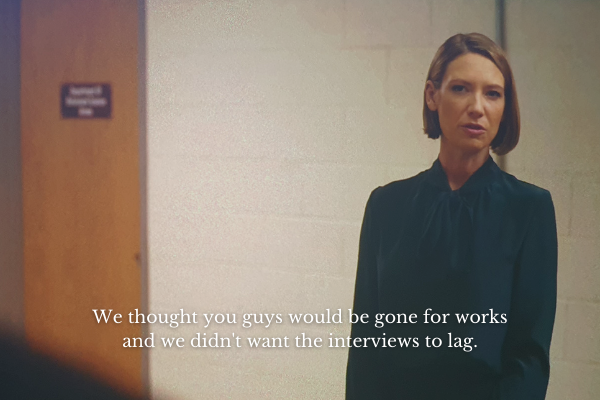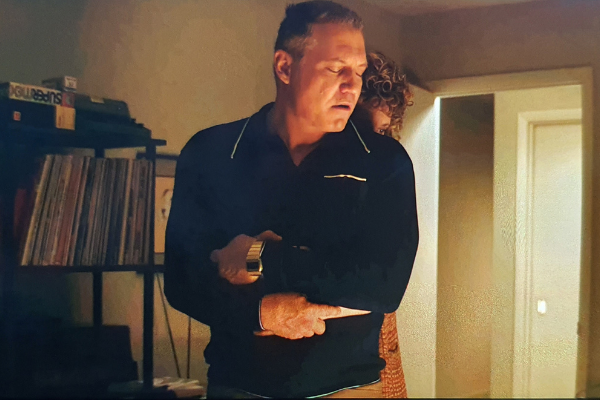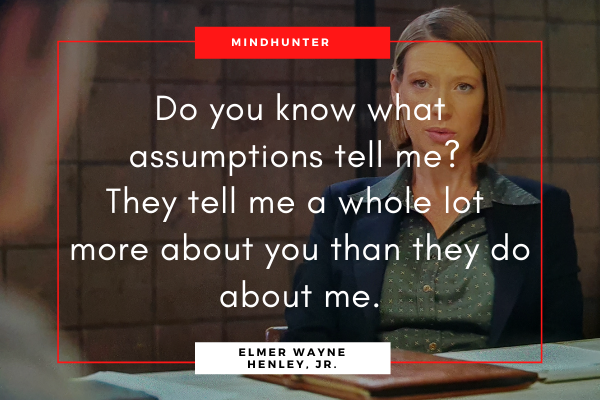Mindhunter examines the early years of the FBI’s Behavioral Science Unit. Based on the 1995 book of the same name by John E. Douglas and Mark Olshaker, the show follows Holden Ford, Bill Tench, and Wendy Carr as they try to establish a database for profiling violent criminals. Mindhunter is a startup story like any other. The team starts out in the basement with little support and they must build their own roadmap to success. Inevitably, they encounter challenges and opportunities that test their own assumptions about the work that they do. In continuation of the first article, we’ve listed down four more ways that we think that Mindhunter echoes the struggles of every startup story ever.
Warning: Spoilers Ahead
Choose people who are compatible with the needs of the company.

Although our strategies at Staff Street for building teams have evolved, one thing remains the same: we always try to match the right people to the needs of the company. One Mindhunter story hits the startup experience real close.
In Episode 8 of the first season, the Behavioral Science Unit starts to expand its operations. They realize they need to hire someone who can do transcription but also has the operational experience to step into more serious roles such as conducting interviews, analyzing data, and helping create the profiling database.
After visiting Jerry Brudos, Holden returns to Quantico to find Wendy and Bill interviewing Jim Barney, an experienced black FBI agent who seems perfect for the job.

Despite Bill’s approval, Wendy later expresses her concerns that, as a black man, Jim Barney might affect responses to their research, being that around 80 to 90% of their subjects are white and likely racist. Eventually, they end up with Gregg Smith, a white, Catholic, wide-eyed, slightly-less-experienced candidate who had been nominated by their boss, Director Shepard.
The storyline raises questions about the insidious ways racism and nepotism affect employment practices. The standards today are far from perfect, but it is interesting to reflect on how far we’ve come in terms of ensuring justice and fairness in the workspace.
At Staff Street, we abide by the best practices today when it comes to hiring. We understand that it’s not an easy job to choose the right people, especially if you’re working on projects across states and countries. But at the end of the day, it comes down to finding the best possible person for the job. While we don’t agree with the final decision of the BSU, we want to discuss some of the details of their hiring process in order to highlight important factors that affect the decision-making when it comes to hiring people.
Tip #1: Get everyone’s input before you get a new hire.
It’s important to discuss matters with the whole team before bringing in someone new. When you’re a startup, you’re starting small. You need people you can rely on. This is the stage in your journey where you’re creating your own road maps and systems. That’s why it’s important to involve the whole team in setting down roles and expectations before you hire new people.

On the show, Wendy Carr states that the BSU needs somebody to do clerical work, like transcription and organization. But as the team continues to grow, their new hire must be able to conduct interviews and analyze data. Throughout the whole process, Holden is barely around except at the end, when he walks in on Wendy and Bill interviewing Jim Barney.
For brevity’s sake, the three main characters give one-liner opinions on why Jim Barney isn’t a good fit. And the story raises the tension when Shepard sticks them with a less experienced Gregg Smith.
Needless to say, it’s important to have a serious and thorough discussion with your team before and after you interview candidates. Set your goals and stick to them. Recognize your dynamics as a team. Focus on finding somebody who will complement your skills and enhance your collective strengths. Getting the whole team involved is a good way to ensure that your choices are informed and grounded in what you really need as a startup.
Tip #2: Prioritize the needs of the business.
We interviewed the Staff Street team about Mindhunter’s hiring storyline. The reality is, it’s rare to find everything you need in one person. It’s easy to find people who are smart and skilled, but some of them don’t turn out to be team players. Startups need to balance out skills and experience with matching interest and enthusiasm. Find people who are willing to learn and communicate, and are excited to show up for the job.

On the show, we saw the different factors that might seem inconsequential to viewers but are very real for companies and businesses. There is immense pressure to align team strategies—which includes hiring—with other strategic goals such as appealing to your market (on the show, to the BSU’s primary clients, the violent killers) and to your investors (for the BSU team, their superiors, FBI Director Shepard).
By choosing Gregg Smith, the BSU believed they were appeasing both. At the cost of taking on somebody who was incompatible with the requirements of the job. Later on in the series, Gregg Smith ends up betraying the team and compromising their integrity.

Beware of your own biases and assumptions, not just about people, but also about the processes involved in running a startup. Prioritize the needs of the whole business, not just parts of it.
Tip #3: Work on a trial period.
In defense of the problematic hiring story, the Mindhunter’s BSU agrees on something that’s necessary for startups trying to grow their team: use trial periods. At Staff Street, we always recommend trial periods, even if you have no reservations about a new hire. A lot of things can look good on paper or during the interview process. But you won’t really know how well you’re going to work together until you do. We recommend working on simple projects that highlight compatibility factors such as the ability to communicate and get along with everybody on the team.
Running a startup is a relay race – not an individual event. Eventually, you have to step in and carry the torch to the next level.
At Staff Street, one of the most important things we look for is enthusiasm. We look for talent and experience, sure. But we also want to find people who are interested in the job. Firstly, because running a startup is a tough gig, which is a reality that we see a lot of in Mindhunter‘s story. The team begins to get stretched thin as they continue to grow. It’s a relay race, where you have to be able to hold your own and take charge when the baton falls to you. The ability to overcome extraordinary odds because of extraordinary teamwork is an asset to any startup.

When Bill and Holden are drawn away from their road trip school in Episode 4 of the second season, Wendy steps up to continue the interviews. She takes Gregg Smith with her. It becomes an opportunity for everybody to test their theories. The team, overall, is growing and taking on different but complementary roles.
When you are trying to build something off the ground, you need people who are driven and passionate. It takes more than talent and experience to be part of a startup story. That requires people who can recognize and seize the opportunity to create something new and take ownership of their role in the team.
Communicate, compromise and adjust your strategies to the facts on the ground
In the notoriously fickle world for a startup, communication is the glue that keeps everything and everyone together. It can’t be overstated how important it is to communicate with your team about everything. As a team, you’re going to face a lot of challenges in and out of the workplace. Disagreements and disappointments are inevitable. The more practice you have communicating with each other, the better you can deal with them.
In Episode 8, when Bill and Holden interview Jerry Burdos, they manipulate him by appealing to his triggers. Wendy disagrees with the method and tensions rise. It’s also the first time on the show that they acknowledge how their work impacts their personal lives. It’s also one of the few times that things get really heated in the workroom.

Over the course of Mindhunter, Holden, Bill, and Wendy let their anger get the best of them plenty of times. They say things to each other that would give today’s HR a headache. But what they’ve also done is find ways to compromise.
The truth is, you’re not always going to get along with the people that you work with. And that’s not a bad thing. Startups and entrepreneurs often wax poetic about surrounding themselves with people who are smarter and more experienced than they are. That comes with strong and independent minds that are not always going to agree with each other.
Communicate your grievances. Don’t let personal disagreements cloud your assessment of the situation. Find a common ground in the facts and adjust your strategies to your strengths.
Leave your assumptions at the door.

As startups and entrepreneurs, we all know there is no one fixed road map to success. To get there, not only do have to be creative, but you also have to be flexible. You have to be ready to leave your assumptions at the door and learn from the facts on the ground.
On the show, as Wendy Carr steps into the shoes of interviewing their subjects herself, she begins to understand why Holden and Bill often stray from the questionnaires. The first prisoner she interviews, Elmer Wayne Henley, Jr., refuses to answer any of the set questions. To break the impasse, Wendy goes off-script. Not only that. She decides to reveal personal details about her life in order to build rapport with Henley, Jr.

Although Carr and Smith go into their interview prepared, they face a reality that any startup entrepreneur only knows too well: the unpredictability of their audience. Carr’s decision to go off script is just one of the things that pioneers and startups need to be ready to do. They have to be able to pivot quickly. Listen to facts on the ground, especially if they don’t fit your assumptions, and adjust.
Running a startup is a full-time job.
Mindhunter highlights the story of a startup. If you’re an entrepreneur, you need a lot of creativity and energy, as well as individual initiative and dynamic teamwork, to create successful endeavors. It’s important to be diligent and equip your decision-making with research and hard data. At the same time, you have to understand your team as people, what they can do and what they need in order to grow. Lastly and most importantly, being part of a startup is a full-time job. The hustle doesn’t end after eight hours. It’s a full-time job.
